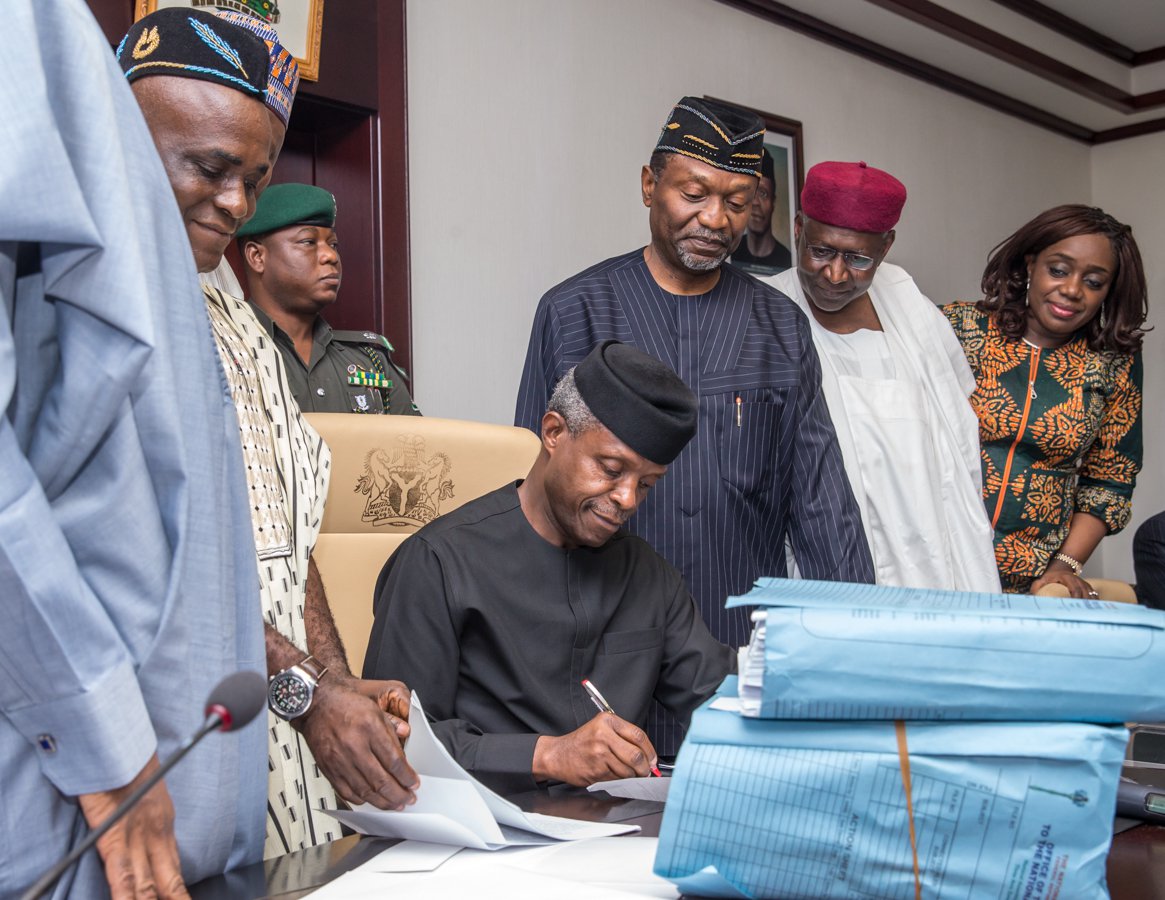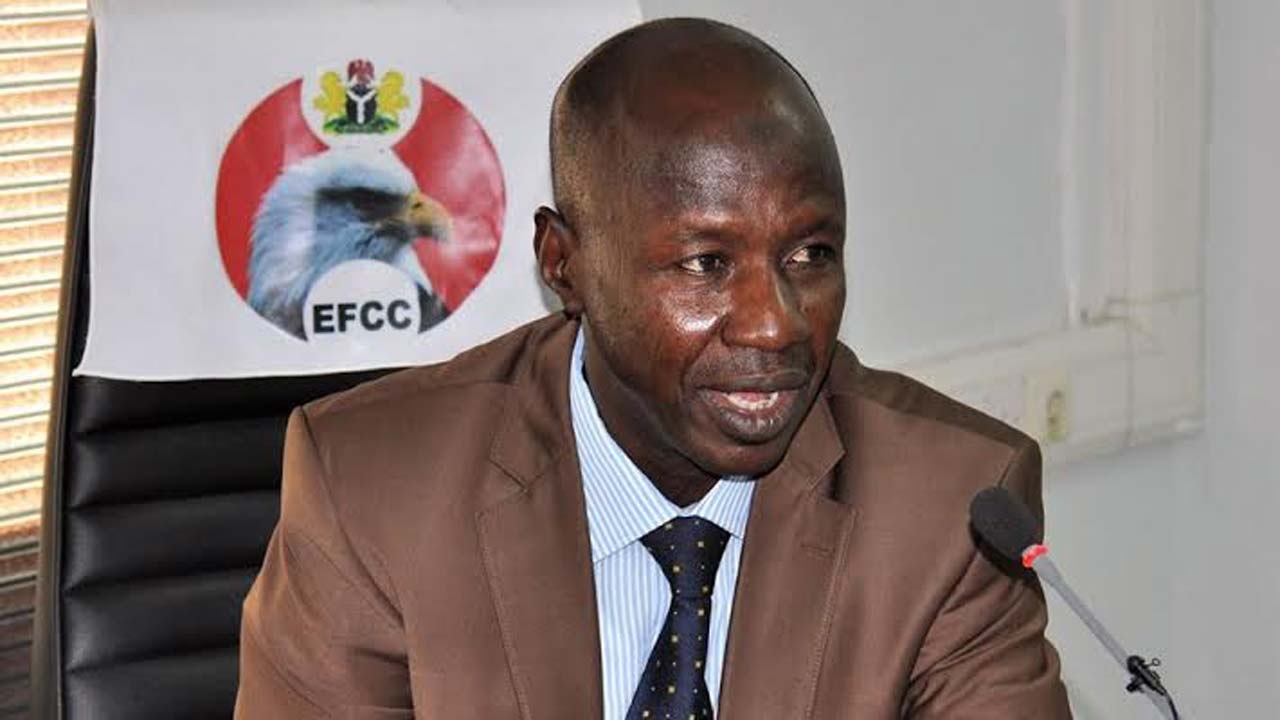2017 Budget: NASS’ introduction of fresh projects sparks row

.Implementation of Budget under threat
.Inclusion of fresh projects at expense of our core projects in bad taste- Presidency
.We have power to alter, introduce new projects- Lawmakers
.SANs divided, urge the Executive to approach Supreme Court for interpretation
Though Nigerians have hailed the signing of the 2017 Budget into law by Acting President Yemi Osinbajo (SAN), the implementation of the budget is under threat, following fresh controversy over the propriety of introduction of about 400 projects by the National Assembly.
Signing the budget amidst expectations, Osinbajo hinted of the troubles ahead when he raised the alarm over the fresh projects, saying that it was gratifying to note that the Executive and the National Assembly had agreed to subsequently bring projects that was altered by way of virement.
The acting president later stirred hornet’s nest during a meeting for early preparation of 2018 Budget when he challenged the propriety of the National Assembly to alter the budget, arguing that the lawmakers lacked the power to introduce fresh projects into the budget.
But the lawmakers have fired back, insisting that they have the power to not only alter the estimates but introduce fresh projects.
Amidst the looming stand-off between the executive and the lawmaking arms of government over power of appropriation on budget matters, some legal luminaries have canvassed a legal option in which case both arms of government would approach the Supreme Court to address the problem once and for all.
While the executive is anchoring its power on section 81 of the 1999 Constitution (as amended), the legislature is insisting on his power by virtue of section 80 of the constitution.
The Senate and the House of Representatives before proceeding for a two-week recess last week declared vehemently that the power to appropriate on budget matters rests exclusively with the National Assembly, both quoting sections sections 59, 80, 81, 82 and 83 to back up their claim.
The Senate President, Bukola Saraki and the Speaker House of Representatives, Hon. Yakubu Dogara, had almost simultaneously taken up issues with Osinbajo on the issue and had implied that Osinbajo was probably oblivious of the provision of the constitution before accusing the lawmaking arms of introducing fresh about 400 project into the 2017 Budget.
The Acting President had since signed the Budget, which he described as Budget of Economic Recovery and Growth aimed towards pulling Nigeria out of the zone of recession.
Although the executive and the legislators were at each other’s throat last week, indications are rife that the two had agreed that funds in the signed 2019 Budget could be vired from different sub-heads to take care of the newly introduced projects by the National Assembly.
In this regard, Virement could be carried out through a supplementary budget which the executive arm is expected to forward to the National Assembly for approval at the appropriate time.
But a presidential aide who sought anonymity on the matter, claimed that the full implementation of the budget would be difficult on the grounds of the new projects.
He said: “I can tell you that though the budget has been signed and the tension in the land has been reduced, the problem of implementation remains the greatest challenge of this government.
“How do you explain a situation where core projects that are dear and crucial to the Federal Government are either slashed, removed or altered while new projects are now introduced by the lawmakers. That is not fair.
“Is it not ironical that even though we have majority members in the National Assembly; they are there or inactive participants of altering projects which they know are very important to this government.
“Where are we going to get the money to funds these new projects?
“But we take solace in the agreement between the executive and the National Assembly to reintroduce these key projects. We are hopeful that common sense will prevail at the end”.
Meanwhile, prominent Senior Advocates of Nigeria, Mallam Yusuf Ali, Prof. Konyinsola Ajayi, Chief Mike Ozekhome and Mr. Femi Falana have waded into the issue.
Though they expressed divergent views over the issue, they urged the executive to quickly approach the Supreme Court to seek proper interpretation on power of appropriation.
The senior advocates spoke in separate interviews with The Daily Times on Sunday night.
While Ajayi and Falana argued that the lawmakers lacked the powers to alter the projects, Ali and Ozekhome disagreed.
Yusuf Ali said: ” When the executive brings a money bill which is widely known as budget to the NASS, it’s just a bill and like other bills submitted to the NASS, it has the powers to amend, add to or remove parts of the bill and in the case of a money bill, I am of the view that there is nothing in the Constitution that takes away the power of the NASS to include projects or remove some from the draft.
“The provisions of sections 80 & 81 of the Constitution are very clear and lucid as to the relative powers of the Executive and the NASS on money bills. The two sections make it very clear that no money can be withdrawn from the consolidated fund of the Federation without the authorisation of an Appropriation Act duly passed by the NASS. A careful reading of section 80 puts the preeminence of NASS into focus when it comes to appropriation of funds.
“Since it is the Executive that is disputing the plenitude of the powers of NASS on the issue of appropriation, then the Executive should approach the Supreme Court on the matter.
For Mike Ozekhome, “The NASS has powers to modify and alter any budget,” adding, “either the Executive or NASS can go to the Supreme Court for interpretation.”
On his own part, Prof. Konyinsola Ajayi said: “No, Senate and House of Representatives do not have the power. Executive to a large extent has the power to prepare the budget. Going to the Supreme Court by either party will be the best way to settle the enlargement of powers and arrogation of authority to itself by the NASS.”
On his part, Femi Falana said: “The National Assembly does not have the power to alter the projects. The 1999 Constitution (as amended) is very clear on the power of the appropriations. While the executive (the President) by the virtue of section 81 of the constitution will prepare the budget and lay it before the lawmakers, the latter will use their power appropriation on the estimates by the virtue of section 81 of the constitution. But the executive should go to Supreme Court to resolve the issue and seek proper interpretation on this vexed issue.”
What the Constitution says:
Powers and Control over Public Funds:
Section 80 (1) of the 1999 Constitution (as amended) state as follows: All revenues or other moneys raised or received by the Federation (not being revenues or other moneys payable under this Constitution or any Act of the National Assembly into any other public fund of the Federation established for a specific purpose) shall be paid into and form one Consolidated Revenue Fund of the Federation.
(2) No moneys shall be withdrawn from the Consolidated Revenue Fund of the Federation except to meet expenditure that is charged upon the fund by this Constitution or where the issue of those moneys has been authorised by an Appropriation Act, Supplementary Appropriation Act or an Act passed in pursuance of section 81 of this Constitution.
(3) No moneys shall be withdrawn from any public fund of the Federation, other than the Consolidated Revenue Fund of the Federation, unless the issue of those moneys has been authorised by an Act of the National Assembly.
(4) No moneys shall be withdrawn from the Consolidated Revenue Fund or any other public fund of the Federation, except in the manner prescribed by the National Assembly.
Power of the Executive- President
Section 81 (1) of the Constitution states that, “The President shall cause to be prepared and laid before each House of the National Assembly at any time in each financial year estimates of the revenues and expenditure of the Federation for the next following financial year.
(2) The heads of expenditure contained in the estimates (other than expenditure charged upon the Consolidated Revenue Fund of the Federation by this Constitution) shall be included in a bill, to be known as an Appropriation Bill, providing for the issue from the Consolidated Revenue Fund of the sums necessary to meet that expenditure and the appropriation of those sums for the purposes specified therein.
(3) Any amount standing to the credit of the judiciary in the Consolidated Revenue Fund of the Federation shall be paid directly to the National Judicial Council for disbursement to the heads of the courts established for the Federation and the State under section 6 of this Constitution.
(4) If in respect of any financial year it is found that –
(a) the amount appropriated by the Appropriation Act for any purpose is insufficient; or
(b) a need has arisen for expenditure for a purpose for which no amount has been appropriated by the Act, a supplementary estimate showing the sums required shall be laid before each House of the National Assembly and the heads of any such expenditure shall be included in a Supplementary Appropriation Bill.
Section 82. If the Appropriation Bill in respect of any financial year has not been passed into law by the beginning of the financial year, the President may authorise the withdrawal of moneys in the Consolidated Revenue Fund of the Federation for the purpose of meeting expenditure necessary to carry on the services of the Government of the Federation for a period not exceeding months or until the coming into operation of the Appropriate Act, whichever is the earlier:
Provided that the withdrawal in respect of any such period shall not exceed the amount authorised to be withdrawn from the Consolidated Revenue Fund of the Federation under the provisions of the Appropriation Act passed by the National Assembly for the corresponding period in the immediately preceding financial year, being an amount proportionate to the total amount so authorised for the immediately preceding financial year.
- (1) The National Assembly may by law make provisions for the establishment of a Contingencies Fund for the Federation and for authorising the President, if satisfied that there has arisen an urgent and unforeseen need for expenditure for which no other provision exists, to make advances from the Fund to meet the need.
(2) Where any advance is made in accordance with the provisions of this section, a Supplementary Estimate shall be presented and a Supplementary Appropriation Bill shall be introduced as soon as possible for the purpose of replacing the amount so advanced.








